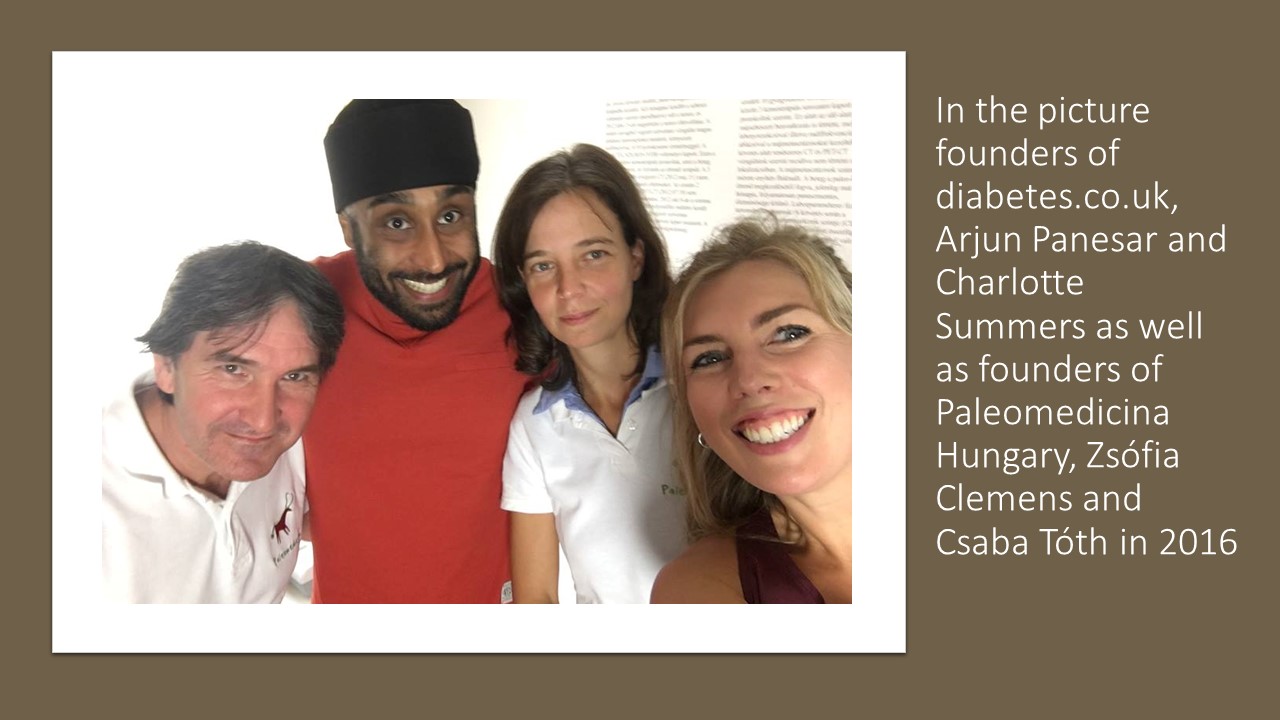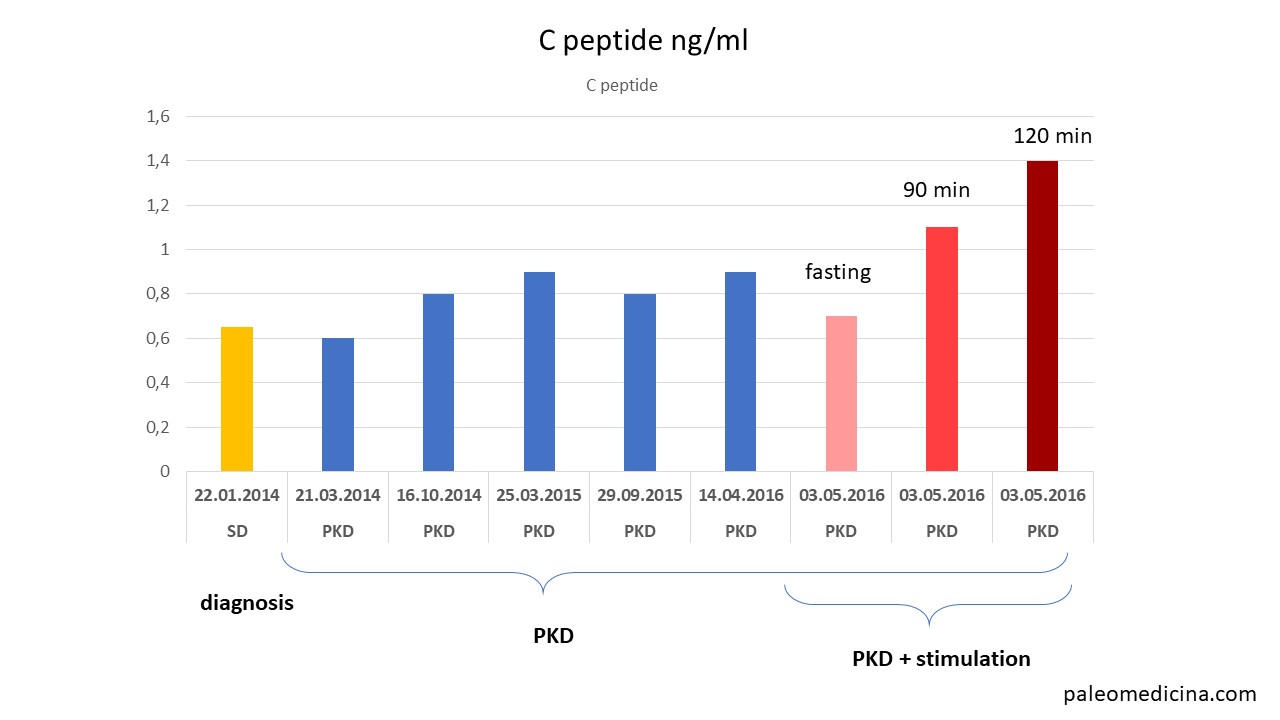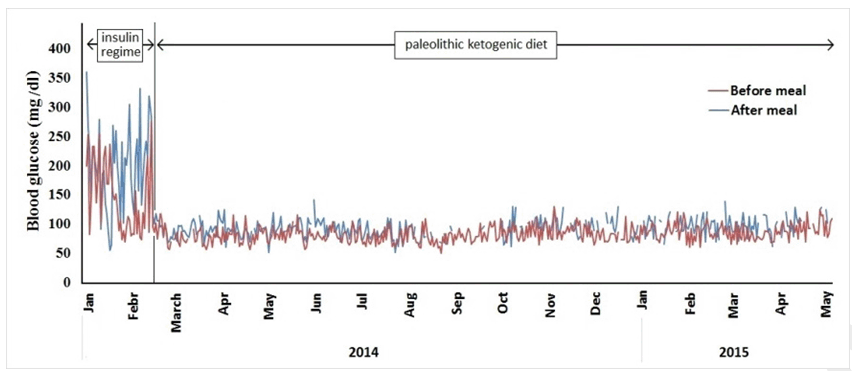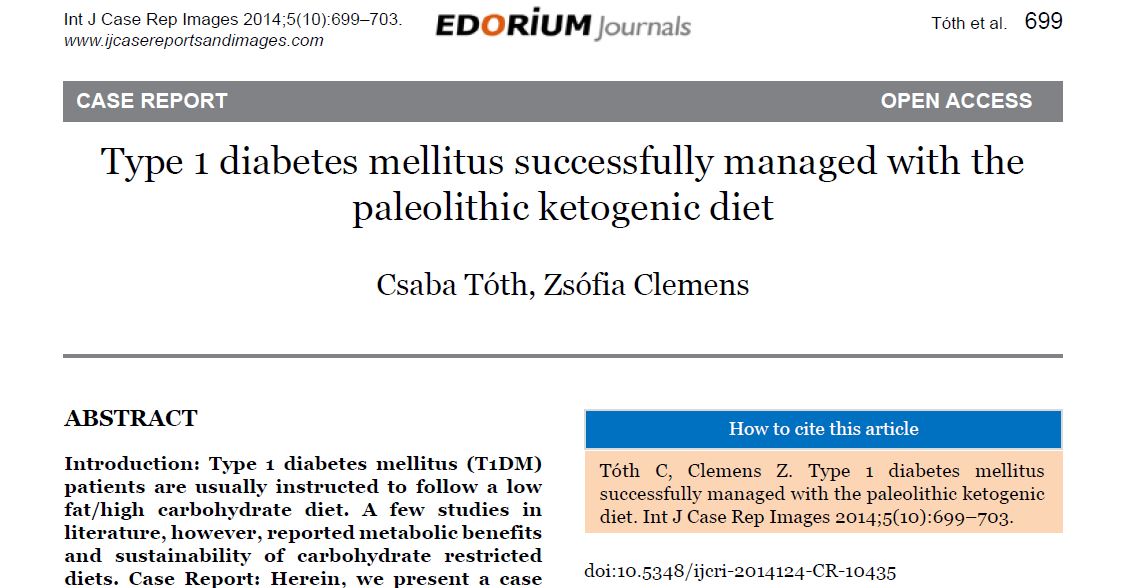Before we get started, here is a brief explanation of the title and of its practical implications.
THE CASE
The diet which is radically different from the current recommendations of diabetologists can cure “regular” autoimmune diseases and can be used successfully in type 1 diabetes. It may stop the death of the cells producing insulin in the pancreas, can help maintain self-production of insulin, and may help achieve insulin-free condition if therapy is initiated close to the time of diagnosis.
These findings have been reported by both Hungarian and French researchers. The Hungarian research team is made up of Dr Zsófia Clemens and Dr Csaba Tóth, the doctor-clinicians and researchers of Paleomedicina Hungary (ICMNI-Medical Rehabilitation Center), and the French doctors are based in Dijon University Hospital. Paleomedicina -ICMNI preceded the French team by 5 years. Our team produced three scientific papers on the subject, while the French team published only one; additionally, the French colleagues call their results unprecedented, thus ignoring earlier results of the Hungarian team.
THE CONSEQUENCES
The results suggest that medicine (especially diabetology) has been given a simple, yet more effective tool to cure newly diagnosed diabetics; in most cases, the patients are children or young people.
This discovery may have further positive consequences. It is a known fact that the efficacy of beta cell transplantation in type 1 diabetics has not yet met the expectations. However, in light of these new findings, patients who have been living with type 1 diabetes for a longer period of time may have better chances in getting a beta cell transplant and even become insulin-free thanks to our therapeutic approach. This makes our findings very important not only for newly diagnosed patients but also for all type 1 diabetics.
Let us see the publications:
The French team’s publications:
Bouillet B, Rouland A, Petit JM, Vergès B. A low-carbohydrate high-fat diet initiated promptly after diagnosis provides clinical remission in three patients with type 1 diabetes. Diabetes Metab. Jul 10, 2019
The Hungarian team’s publications:
1.
Tóth C, Clemens Z. Type 1 diabetes mellitus successfully managed with the paleolithic ketogenic diet. Int J Case Rep Images 2014; 5(10):699–703.
2.
Tóth C, Clemens Z. A child with type 1 diabetes mellitus (T1DM) successfully treated with the Paleolithic ketogenic diet: A 19-month insulin freedom. Int J Case Rep Images 2015;6(12):752–757.
3.
Clemens, Zsófia and Tóth, Csaba (2019) "Paleolithic ketogenic diet (PKD) in chronic diseases: Clinical and research data," Journal of Evolution and Health: Vol. 3: Iss. 2, Article 6.
WHO GETS CREDIT FOR THE DISCOVERY?
In the scientific world, there is constant interest and sometimes serious debate over who solves a medical problem first, partly because the purpose of a researcher's life is to discover or answer a question. Recognizing and respecting discoveries is also important because it is a significant pillar of the research community; respect for colleagues and predecessors and for the path they have taken as well as the results they have produced is an important part of scientific behavioral culture.
There are significant and less significant scientific results and discoveries. Obviously, recognition of achievement and innovation is more important when it comes to a major issue; that is a problem which is universally relevant to humanity, or a major discovery which promotes the health of some people. Even more so when it comes to sick children. The subject of this paper is such an important issue.
Sometimes, the priority of a scientific discovery is relatively difficult to determine due to ongoing parallel researches. There is also the issue of giving credit for medical results and its ethical implications, which are difficult to follow up on. We Hungarians are particularly affected. Although it is not widely known, but this is what happened to Albert Szent-Györgyi when the American biochemist Charles Glen King tried to claim credit for Szent-Györgyi’s groundbreaking discovery of vitamin C. However, the investigation of the Patent Office and later the Nobel Prize Committee made it clear that it was Szent-Györgyi’s discovery, and thus he received the Nobel Prize in 1937 instead of King.
The same is true for our case in which a French medical team is trying to claim credit for the groundbreaking result of our medical research team.
CHRONOLOGY
We published our first paper in 2014, in which we uniquely propose that the method we use can stop the progress of type 1 diabetes in children, and can maintain or boost their insulin production. No similar paper had been published before our article.
We had presented our results at a Hungarian scientific conference before the first scientific article was published. This was followed by numerous foreign conference proceedings and reports in Europe and the Americas. Diabetes.co.uk, which is and will continue to be the largest civilian diabetes organization in the world, has repeatedly reported on our work (e.g. here, here and here), and its founders and representatives have visited our clinic. Several low-carb forums, including the French-language nutrition magazine LaNutition, have reported on our results in type 1 diabetes (here and here). We even came across a statement claiming that we are at least 10 years ahead of everyone, but the discovery is so incredible that it is precisely why it cannot trigger change yet.
Five years later, a French medical team achieved similar results and now try to take credit for this discovery. The five-year gap, especially considering the accelerated flow of information in our age, leaves no doubt about the significance of our research. Half a decade is a very long time in the scientific world and there is no doubt that our team was first to establish this medical method. Now, this does not seem to be clear for everyone.

Figure: The founders of diabetes.co.uk visiting Hungary to learn about our work. Background of a poster detailing the sensational results.
A DIFFICULT CASE IN THE WORLD OF THE INTERNET
1.
How come the French diabetologists were not informed about our results for five years (even though they were published in a French-language specialist magazine too)? At the same time, researchers from other countries in the United States, Turkey, Brazil, Italy, Germany, South Africa etc. have quoted these articles on a regular basis and we can reasonably assume that our studies are accessible for the research community.
2.
The editors of the magazine Diabetes & Metabolism, which published the French team’s paper, and the diabetes experts who reviewed the article do not seem to have known about the results of the Hungarian medical team either.
We do not suspect intentional silence on the part of our French medical colleagues and we assume that our publications were not deliberately overlooked, although it is undoubtedly a pleasant feeling to be first in the discovery of such magnitude. We know that.
In any case, facts remain facts and error is error. Of course, the latter should be corrected, which is possible as the study is "in-press", that is, before publication and could be corrected without retracting the article. Of course, we asked both the professional journalist and the authors of the article to correct the error. It has not been done so far and the authors of the French article did not respond; however, the editor-in-chief acknowledged the problem. Will it be corrected before the publication or will we have to ask for a rather unpleasant article retraction due to ethical and legal issues? We will see.
WHY IS IT IMPORTANT TO GIVE CREDIT FOR OUR RESULTS?
Part of understanding the importance of giving credit for discoveries is that no method or procedure for restoring human health can be patented; this is due to ethical and humanistic reasons. So while an engineer or IT professional can protect his or her own discovery, a doctor cannot. If it had been possible, we would have done it in 2014, because the method could have received much more attention due to patent protection and could have saved much more of the 250-300 newly diagnosed children with diabetes in Hungary each year.
The paleolithic ketogenic diet (PKD), as a method for stopping autoimmune processes, cannot be protected through law or patent regulations. However, paleolithic ketogenic as a word composition has been protected with the aim of preserving the original content of the term. In Hungary, the word composition is protected, and its registration in Europe and the United States is almost completed. However, this, as mentioned, does not mean that the methodology is protected, nor does it automatically recognize the creator of the method and the team of physicians who deliver the results for the first time.
Getting credit for our discovery is extremely important for us because we did and do our research on our own merits, without the support of the state and without scientific grants; we have to face many difficulties (see Hungarian Diabetes Society). We acknowledge our colleagues’ work and respect our forerunners.
THE ETIOLOGICAL ROLE OF NUTRITION
Recently, research on the etiological role of nutrition has become more important. Many professionals deal with it through different methods, although it is still difficult to break free from mainstream medical conventions. We built a compact and functional rehabilitation and research system parallel to academic medicine. We successfully operate this system in Hungary and in Norway. It is also true, as international representatives of nutrition science have pointed out, that there is currently no other research-clinical center in the world that has accumulated so many and valuable clinical data in the field of nutrition intervention. Our groundbreaking results with type 1 diabetes can be transferred to the treatment of other autoimmune diseases and tumors; however, these results are still not acknowledged by mainstream medicine, and it was the case with type 1 diabetes for 5 years. When the results were finally noticed, the Hungarian Diabetes Society, instead of giving us credit for the findings, attacked us.
In light of the current debate, the reaction of the Hungarian Diabetes Society at the time now seems ridiculous. It will be interesting to highlight the professional and moral responsibility of the leaders of the Hungarian Diabetes Society.
THE SCIENTIFIC RESULT
Many may argue that there had been research on the use of low-carbohydrate diets in type 1 diabetes before our publications. This is true and we reference them in our articles. What is new compared to existing results is that we demonstrated first that a low-carbohydrate diet (or any method) can stop the decline of the own insulin production, or even increase insulin production, while patients may become completely insulin-free if therapy begins shortly after the diagnosis. This is a great scientific realization.
The French colleagues achieved similar results in three patients: they stopped the decline in their own insulin production and their patients became insulin-free; in fact, they reproduced our results. Our original contribution to the field, as opposed to that of the French team, is that we were able to substantiate this result in more patients and in more detail through more accurate patient follow-up (years of C-peptide measurements over years) 5 years earlier. In addition, we introduced a methodological innovation specifically designed for low-carbohydrate diets.
The essence of this methodological innovation is the introduction of the paired C-peptide measurement, which is the measurement of the stimulated C-peptide in addition to the fasting C-peptide measurement within a very short space of time. This measurement methodology provides a solution to the methodological problem of a low carbohydrate diet. We have also published this in the articles.

Figure: Sequential C-peptide measurement over a three-year follow-up of a type 1 diabetic patient. Figure from a presentation by Paleomedicina staff at the 2018 Giessen Congress of Evolutionary Medicine.
A POSITIVE UNDERSTANDING OF THE CASE
Of course, we are not bitter, because this debate is not at all about the possibility of stopping the autoimmune process in type 1 diabetic children. This is possible, as shown in the results of two independent medical teams. This is clearly a positive development.
The fact that the French medical team repeated our results is satisfying for us because years ago Hungarian diabetology would have attacked and discredited us for the claim that Type 1 diabetes can be cured and our diet may stop the process of destroying insulin-producing cells in the pancreas.
To put it mildly, they disparaged us for what we do, and Hungarian diabetology used all their means to block our progress. Let us add that many representatives of Hungarian popular nutrition science have been also partners in this. Another difficulty was that, despite the excellent results, it was not easy to publish our findings, because mainstream nutrition science (and of course the diabetics journals) rejected our studies without further review.
And now, the French team is presenting our results in a diabetology journal, the same findings we have been attacked for 5 years. Very few people were interested in our publication, and we were laughed at, while the French results are being celebrated all over the world.
What has been proved is a scientific fact and one important criterion is that science does not depend on its practitioners. In Hungary, France and everywhere, the same laws operate biology, and the same scientific truth applies. However, finding a method to save children and applying it first in a clinical environment is not merely of symbolic significance.

Figure: Blood glucose with insulin and standard diabetes diet and during Paleo-Ketogenic diet without insulin: the difference is striking in our patient.
THE FUTURE OF THE TREATMENT OF TYPE 1 DIABETES
It looks like we will be able to rewrite a delicate point in medicine, and we are going to rewrite many more similarly fascinating details here in Central Europe. Hopefully, we will give many children a chance to recover. We did all of this here in Hungary, lacking billions in research funding, relying on our own mental and financial strength, perseverance and determination, with a small hard-working and creative team.
At this point, we also note that in Poland the official pediatric protocol two years ago has included the paleolithic ketogenic diet for the treatment of inflammatory bowel disease in children. It seems that the news of this has not yet returned to our country.
Thanks to the staff at our clinic and our laboratory; they are always going against prevailing mainstream ideas because they know that this is the only right way in medicine:
Dr. Zsófia Clemens, Dr. Csaba Tóth, Dr. Andrea Dabóczi, Dr. Enikő Andrásofszky, Dr. Péter Váczi, Dr. Péter Merész, Dr. Tibor Nagy, Dr. Mária Köteles, Katalin Lőrincz, Mária Schimmer, Gyöngyi Klukné, Natalie Daniels, Michael Graeme, Balázs Borka, Ferenc Nagy
WARNING: For type 1 diabetes, especially type 1 diabetic children, do not experiment at home without medical advice! Although treatment has become much easier, it requires professional medical assistance.
The article in Hungarian - A cikk magyarul
2019-08-10
 Rehabilitáció csak online elérhető
Rehabilitáció csak online elérhető
 E-mail: paleomedicina@gmail.com
E-mail: paleomedicina@gmail.com



